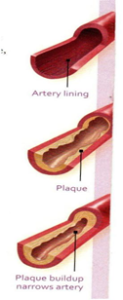You’re at risk for high blood pressure if you:
- Have a family history of blood pressure. You’re more likely to have high blood pressure if your sibling, parent or grandparent has or had it.
- Aren’t physically active.
- Are overweight.
- Eat an unhealthy diet that’s high in salt and sodium.
- Drink a lot of alcohol. This means drinking more than two glasses a day for men, or more ha one glass a day for women.
Other factors like age and gender can also increase your risk. To learn more risk factors for high blood pressure, go to healthy advice.com/High BP

High blood pressure doesn’t have any symptoms. So make sure to have your blood pressure taken at every doctor’s visit, or at least once every two years to keep an eye on it.
Blood pressure and your heart
Blood pressure is the force of blood pushing on the walls of your arteries. Arteries are blood vessels that carry blood away from your heart to other parts of your body.
When your heart beats, it pumps blood into your arteries. This is when your blood pressure is highest.
It’s called systolic pressure, and it’s the top number in your blood pressure reading.
In between beats, when your heart is at rest, your blood pressure is lower. This is called diastolic pressure, and it’s the bottom number in your blood pressure reading.
(Systolic) 120 /80 (Diastolic)
What happens when you have high blood pressure
When you have high blood pressure, which is also called hypertension, blood is pumping against the artery walls with too much force. Over time, this damages your arteries:
time, this damages your arteries:
- The arteries are overstretched, which causes weak places to form in the lining. These weak areas are more likely to rupture, or split open.
The artery walls can also tear. When this happens, scar tissue forms to cover the tears.
- The scar tissue makes it easier for things like fatty buildup, called plaque, or blood cells to get stuck there as they travel through our artery.
- Plaque or blood cell buildup narrows the artery. This is called atherosclerosis. Blood has trouble passing through the artery, putting even more pressure in the walls. If an artery becomes completely blocked, you could have a heart attack or stroke.
Working with our doctor
To make your treatment or prevention plan work for you, take an active role in your care.
This means you:
- Talk honestly about your eating, exercise, alcohol and smoking habits.
- Ask questions if you don’t understand.
- Tell your doctors if your medicine is too expensive or causes to many side effects. Don’t just stop taking it.
- Schedule follow-up appointments.
Latest findings
Think your blood pressure reading is high in your doctor’s office because you are nervous?
Research shows that patients whose blood pressure rises during doctor’s visits are more than twice as likely to have high blood pressure 10 years later.
If this sounds like you, buy a home blood pressure monitor from your pharmacy to keep track of your readings. Knowing how your blood pressure changes over time can help your doctor give you the treatment you need.
Know your numbers
Work with your doctor to find out where your blood pressure falls in the chart below.
| Blood pressure category | Systolic mm Hg (top number) | Diastolic mm Hg (bottom number) |
| Normal | Less than 120 | Less than 80 |
| Per hypertension | 120-139 | 80-89 |
| Hypertension stage 1 | 140-159 | 90-96 |
| Hypertension stage 2 | 160 or higher | 100 or higher |
Checking blood pressure at home
To get an accurate reading
- Take it at same time every day.
- Don’t smoke; drink caffeine or exercise for 30minutes before you take it.
- Sit up straight with your feet flat on the floor
- Rest your arm on a flat surface, so it’s even with your heart.
- Take two or three reading, and write down the results. Share with your doctor.
Treating high blood pressure
Making lifestyle change is usually the first set in treating or preventing high blood pressure. If these don’t help, your doctor may recommend treatment. If you need medicine, you may have to try more than one medicine, or combination of medicines, before you and your doctor find what works for you.
Different blood pressure medicines do different things. They can.
- Help your body get rid of extra sodium (salt) and water in your blood so there’s less blood for your heart to pump.
- Reduce your heart rate and the amount of blood your heart pumps, so it doesn’t have to work as hard.
- Relax and open blood vessels, so blood can pass through them more easily.

Other health condition, like diabetes, high cholesterol, sleep apnea and kidney disease can affect your blood pressure. If you have any of these conditions, take to your doctor about treating or managing them to make sure they don’t interfere with your blood pressure.
